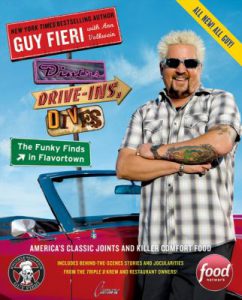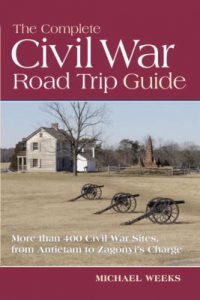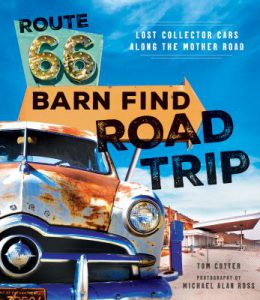Road trip! The quintessential American vacation
Posted on July 3, 2018 at 6:00 am

by Melissa Rhoades
Have you heard of Horatio Nelson Jackson? This under-celebrated trailblazer was the first person to drive an automobile across the U.S. In 1903, ten years before Ford Motor Company began mass producing cars, Jackson left San Francisco in a two-cylinder Winton with a mechanic as his travel companion and a $50 bet as motivation to drive all the way to New York. With no highway system in place, he followed a tenuous thread of loosely-connected dirt roads, cow paths, and railroad beds. Imagine how many tires he had to change.
Less than a decade later, “auto trail” organizations began to form. These groups worked to clarify viable routes for early motorists. By 1926, an integrated, numbered national highway system officially started to connect the country. One of the most popular and enduring routes created by this system is Route 66, inspiration for the 1946 hit song “(Get Your Kicks on) Route 66.” Another is Route 101 that hugs the coastline from California to Washington State.
By the time Eisenhower’s Interstate Highway System was authorized in 1956, the American middle class had more time and money to spend than ever before. Simultaneously, automobiles were eclipsing public transportation as suburban developments lured people out of cities. Cars were not only changing the landscape, they were changing how people lived.
They were also getting increasing attention from writers. In 1957, Jack Kerouac’s On the Road proved that road trips weren’t just for kicks but also for developing a state of mind, a mystical, heightened experience and self-discovery. John Steinbeck’s 1962 book, Travels with Charley in Search of America, also includes elements of self-discovery but from the reflective vantage point of an older writer.
Easy Rider exploded on the big screen in 1969 with a motorcycle road trip that not only echoed the theme of self-discovery but also placed the growing chasm of America’s culture wars on display. Since then, road trip movies have proliferated to include a wide range of styles such as comedies like National Lampoon’s Vacation, dramas like Thelma & Louise, and contemplative stories like Nebraska.
Back when the Interstate System broke ground in 1956, my Dad was a college-aged gearhead tinkering with his third or fourth car. By the time Easy Rider was released, my brother was a toddler, I was a newborn, and we had both already experienced our first road trips—which, let’s face it, is a testament to my parents’ optimism and patience!
Throughout my childhood, the four of us packed into the family car to putter from our home in Kansas to Florida, Ohio, Illinois, Massachusetts, Pennsylvania, the Dakotas, Colorado, and Wyoming. By the time I finished college, I had added Texas, Nevada, New Mexico, Arizona, and California to that travel list. I had fully embraced what Joni Mitchell called “the refuge of the road.” As William Least Heat-Moon described it, “When you’re traveling, you are what you are right there and then.”
In other words, travel provides the opportunity to live in the present.
Many forms of travel appeal to me, and I’ve enjoyed planes, trains, boats, bicycles, and the treads of my boots. But car travel provides a unique experience. Similar to hiking or cycling, cars offer the freedom to move when and where we want but at a faster pace. And while cars are faster than boots or pedals, the road still provides a pace slow enough to allow for reflection on long stretches across rural areas that some might misconstrue as monotonous.
Having experienced this carefree state of mind makes it even more tragic to realize that journeying by car has never been equally safe for everyone. Recent headlines remind us that African Americans still deal with unequal treatment on the road. Before legally sanctioned segregation was struck down in the 1960s, things were worse. In addition to threats of unwarranted traffic stops, intimidation, and physical violence, African Americans could be refused food, gas, auto repairs, and lodging due to legalized discrimination. Thus was born the The Negro Motorist Green Book, often called simply The Green Book. New York City mailman Victor Hugo Green first published this indispensable volume in 1936 and updated it annually through 1966 to help African Americans find relatively safe amenities and routes.
LGBTQ communities across the country similarly self-publish guides with tips for safe travel. Today, the internet makes it easier to find travel tips for specific populations, and online resources include sites like Nomadness Travel Tribe for people of color and Dopes on the Road for LGBTQ travelers—just two of many resources available.
If you want to travel but have safety concerns—for any reason—browse the web. Chances are, someone has already created a website with useful information to help you.
Those of you who’ve already planned a road trip this summer, I salute you. Enjoy the open road! If you don’t have a plan, but you’d like to give a road trip a try, it’s not too late. The library offers plenty of resources to spark your imagination and help you find your ideal route.
For general guides on road trips, browse our nonfiction shelves for the 917 call numbers for books and DVDs.
For creative road trips, the following selections provide a small sampling of books that offer unique ideas for specialty, themed excursions.
Barn Find Road Trip and Route 66 Barn Find by car guru Tom Cotter
These ideas will get gearheads drooling. Packed with glossy full-color photos, these books follow the author as he hits the pavement in search of everything from salvage-yard junkers to pristine, polished classic cars. He also shares unexpected gems like a like a restored vintage Texaco Gas Station and historic eateries along the Mother Road.

Diners, Drive-Ins and Dives by The Food Network’s Guy Fieri
Much like the TV show by the same name, this book focuses on independent restaurants—with a special affinity for Mom & Pop establishments. Fieri travels across America in a 1967 Camaro looking for hidden culinary gems. The book is divided into four geographical regions and includes a brief write up, plus a recipe, for each restaurant featured.

The Complete Civil War Road Trip Guide by Michael Weeks
This guide offers unexpected opportunities for history buffs. While much of the book focuses on eastern and southern states as you may expect, it also details landmarks in Kansas, Missouri, Oklahoma, Arkansas, Minnesota, North Dakota, Colorado, New Mexico, and Idaho. Weeks also includes historical context, including “People to Know” sections for each geographical area covered.

Utopia Drive by Erik Reece
Delve into another driving element of American history—the utopian ideal. This travelogue will take you through various historic East Coast communities, but if you want to stay further west, you can visit communities like the Amana Colonies in Iowa and the “ecotopia” Arcosanti in Arizona.
For nature lovers, America’s extraordinary selection of National Parks offers ideal destinations. Choose your next park to visit by browsing library materials on our National Parks and the National Park Service website.
If driving hundreds of miles cross country doesn’t sound like your type of ride, then try a shorter road trip for just a weekend or a day. The Inland Northwest offers beautiful and unique nature destinations like the Palouse Falls, Soap Lake, and Steptoe Butte—not to mention popular recreational destinations like Priest Lake and Roosevelt Lake. You can even do themed trips on a smaller scale, for example focusing on the Roadside Geology of Montana, Idaho, or Washington.
For day trips where you can take the passenger’s seat, look for adventures with transportation included via the Spokane City Parks and Recreation, Spokane Valley Parks and Recreation, and Spokane County Parks and Recreation.
Whether your road trip is long or short, certain preparations will help make the journey more enjoyable. Here are some tips based on personal experience:
- Check your tire pressure (including the spare) and car fluids before heading out. If your vehicle hasn’t received maintenance in a long time, get a full tune-up for peace of mind.
- Fill the gas tank as you head out. This will ensure you get maximum miles behind you before you need to stop—which adds to the feeling of freedom.
- Pack a few emergency supplies in an easy-to-access spot. Some extra water (for you and your radiator), extra car oil, a flashlight, an emergency blanket (for warmth or shade), and a basic first-aid kit are good items to have in your trunk at all times.
- Make sure to bring your insurance information. Many insurance companies cover emergency roadside assistance and all you need is the phone number to call.
- Bring some of your own food and eat at rest stops when you can. By not relying on roadside restaurants for all your meals, you’ll not only save money but also eat healthier and save time.
- Pack food and water bottles in an easy to reach location (don’t hide them under luggage you won’t need for several days). Make sure to place perishables in a cooler with plenty of ice.
- Bring along a detailed paper map. You never know when online maps or your GPS will stop working or otherwise lead you astray.
- Don’t rely on technology to keep you entertained. Converse and spend quality time with your travel companions. Old fashioned car games like Car Bingo can be a great group activity with kids, as well as sharing giggles from books like Laugh-Out-Loud Road Trip Jokes for Kids.
- A good music selection can really save the day on long, straight stretches of road! If you want some new tunes to try, browse the library’s CDs or stream selections from Hoopla.
While less tangible than the above suggestions, I also like tips Andi Eaton provides in her fashionista-bohemian travel guide Wanderful. Eaton suggests we find beauty in imperfection (embracing the Japanese concept of wabi-sabi), stay present, focus on possibilities, and find happiness in curiosity. There’s no better way than that to mentally prepare for the road.
Tags: adults, advice, automobiles, booklists, books, family, hoopla, National Parks, nonfiction, parks and recreation, reading, road trip, road trip games, road trip tips, themed vacations, travel, travel guides, vacation


